Refusing to dwell upon the “subjunctive abyss”—that bottomless, tormenting sense of what has been denied or taken away—Eumaios the swineherd gives his energies to what he can do and do well. He practices virtue on his own with no one else to enforce it and reminds the wandering Odysseus what real nobility is.
 Whatever I happen to be teaching in my Humanities class often makes its way into these weekly meditations, whether it is Descartes’ Discourse on Method, Milton’s Paradise Lost, or Dostoevsky’s Crime and Punishment. In HMN 101, as we work through the Iliad and Odyssey, I have been thinking about what comes to us with a hardy perennial freshness from the poems of Homer, such as Agamemnon’s example of extraordinarily bad leadership or Odysseus’ confrontation with Mediterranean geography. In our seminar the other day, we were discussing the books just past the middle of the Odyssey when Odysseus returns home to the island of Ithaka at last. The goddess Athena, who greatly admires and helps him, warns him not to go directly to his own household, which is filled with the overbearing and violent suitors of Odysseus’ wife Penelope. Instead, she tells him, he should go to stay with the swineherd Eumaios, and she transforms him with a tap of her wand into a cosmetic surgeon’s nightmare: she ages and loosens his skin, balds his head, and dims his eyes, then clothes him with a ragged old cloak.
Whatever I happen to be teaching in my Humanities class often makes its way into these weekly meditations, whether it is Descartes’ Discourse on Method, Milton’s Paradise Lost, or Dostoevsky’s Crime and Punishment. In HMN 101, as we work through the Iliad and Odyssey, I have been thinking about what comes to us with a hardy perennial freshness from the poems of Homer, such as Agamemnon’s example of extraordinarily bad leadership or Odysseus’ confrontation with Mediterranean geography. In our seminar the other day, we were discussing the books just past the middle of the Odyssey when Odysseus returns home to the island of Ithaka at last. The goddess Athena, who greatly admires and helps him, warns him not to go directly to his own household, which is filled with the overbearing and violent suitors of Odysseus’ wife Penelope. Instead, she tells him, he should go to stay with the swineherd Eumaios, and she transforms him with a tap of her wand into a cosmetic surgeon’s nightmare: she ages and loosens his skin, balds his head, and dims his eyes, then clothes him with a ragged old cloak.
But the next few books of the poem are less about Odysseus than about Eumaios, whose situation in life engages the contemporary dialogue about being “woke.” Eumaios is a slave, bought by Odysseus’ father Laertes from Phoenicians who stole the boy, son of a king, from his home island. Eumaios grew up in the household with Odysseus’ youngest sister “Ktimene of the light robes,” and Odysseus’ mother Antikleia loved the boy “from the heart.” After Ktimene married a man on the island Same, Eumaios moved out to the estate as a swineherd, and now Odysseus in his deep disguise after twenty years away meets this dmōs or slave, as Eumaios forthrightly describes himself.
Race per se never seems to come up in the Homeric world, but social distinctions are sharp. For example, when Eumaios welcomes the beggar and generously sacrifices two pigs to serve to him, he says, “Eat now, stranger, what we serving men are permitted / to eat: young pigs, but the fattened swine are devoured by the suitors, / who have no regard for anyone in their minds, no pity.” (14.80-82) Eumaios will not eat fattened swine, because they are not rightfully his as a slave, whereas the suitors, who do not own them and have no right to them, demand several swine a day. But if they do it, what stops him from doing the same thing? Instead, he eats his allotted “young pigs,” apparently ignorant that slavery itself is unjust. Eumaios seems pitiably unaware of his self-enforcement of a social practice—the slavery universal in the ancient Mediterranean world, including the world of the Gospels—that deprives him of a full life. Has this poor man simply internalized the master-slave relation so thoroughly that he can no longer think outside it?
Rather, he is the most thoroughly self-possessed man—other than Odysseus himself—in the whole of the Odyssey. A little later in the poem, when Odysseus (still in disguise) asks why the splendid dog Argos was not better cared for, Eumaios explains and partially excuses the negligence of his fellow slaves:
Serving men [dmōes, slaves], when their masters are no longer about, to make them
work, are no longer willing to do their rightful duties.
For Zeus of the wide brows takes away one half of the virtue [aretē]
from a man, once the day of slavery closes upon him.
Half of his own virtue is already lost because of his slavery, as he implicitly admits to the stranger. He reveals a full consciousness of his deprivation. Despite what he has lost, however, he will not give way to viciousness, as his insolent fellow-slave Melanthios does.
He would lose the whole of his virtue if he “ate out the heart within him” (a common Homeric line) in bitterness about his lot and gave up the habitus of intelligent vigilance. He does not blame the gods but honors their laws and entrusts himself to their protection. He tends the herds of swine entrusted to him, authoritatively maintains the good order of the estate, and keeps alive for others, including Telemachos, the memory of what aretē looks like in Odysseus. Refusing to dwell upon what I call the “subjunctive abyss”—that bottomless, tormenting sense of what might have been, of what has been denied or taken away—he gives his energies to what he can do and do well. Above all, he serves right order in himself, and he practices aretē on his own with no one else to enforce it. He reminds the wandering Odysseus what real nobility is.
In this story from almost 3000 years ago, students of Homer can find an honest appraisal of the human condition, which always and everywhere includes exploitation of the lives of some for the benefit of the stronger. Regardless of how it arises, such injustice must always and everywhere be addressed heroically, politically, educationally—as well as possible, as Homer shows. Students of Homer also find that no one escapes suffering, not even supposedly privileged people—Odysseus and Penelope, for example, who undergo enormous deprivation and opposition. Homer’s readers find, apropos of being “woke,” a bracing rejection of victimhood per se as the higher moral position, a looming retribution for those who recklessly defy the unchanging laws, a profound and moving trust in the beauty of good order, a strong preference for the content of character, and powerful grounds for hope when virtue shines in those with the least expectation of external reward.
Republished with gracious permission from Wyoming Catholic College’s weekly newsletter.
The Imaginative Conservative applies the principle of appreciation to the discussion of culture and politics—we approach dialogue with magnanimity rather than with mere civility. Will you help us remain a refreshing oasis in the increasingly contentious arena of modern discourse? Please consider donating now.
The featured image is “The Swineherd” (1810) by James Ward (1769-1859) and is in the public domain, courtesy of WikiArt. It has been brightened for clarity.


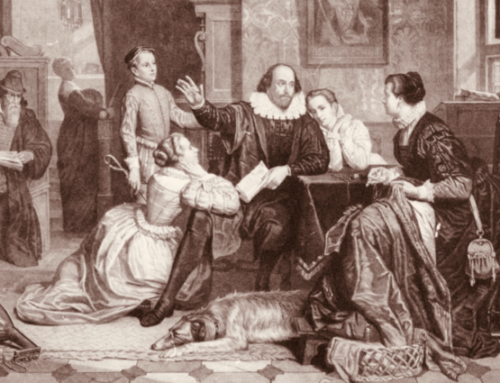
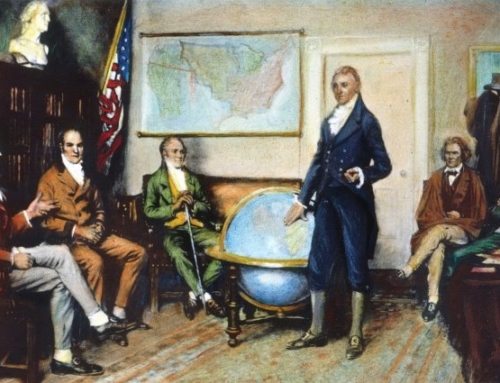
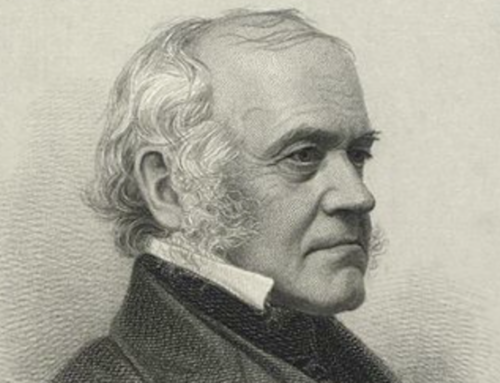
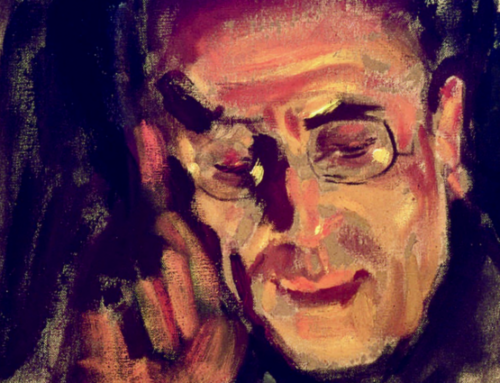
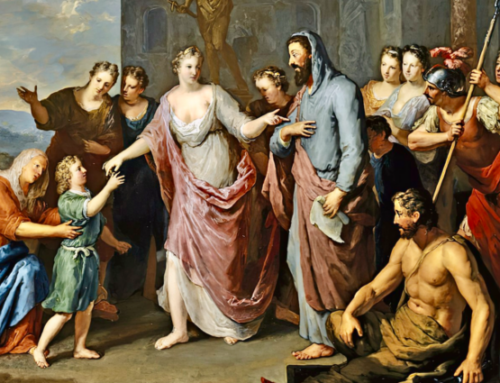
Leave A Comment